July 21, 2020
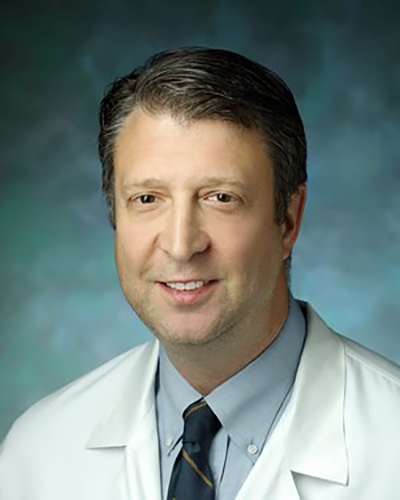
Dr. Efron, Who Heads Trauma Surgery at Johns Hopkins Will Work With Longstanding Trauma Director and Physician-in-Chief Dr. Thomas Scalea
Thomas M. Scalea, MD, the Honorable Francis X. Kelly Distinguished Professor of Trauma Surgery and Director of the Program in Trauma at the University of Maryland School of Medicine (UMSOM), and Physician-in-Chief at the UM R Adams Cowley Shock Trauma Center, along with UMSOM Dean, E. Albert Reece, MD, PhD, MBA, announced today that David Thomas Efron, MD, one of the leading trauma surgeon-scientists in the U.S., will become the Inaugural Thomas M. Scalea Distinguished Professor of Trauma Surgery in the Department of Surgery, Chief of Trauma and Medical Director of the R. Adams Cowley Shock Trauma Center. He will begin his new position effective September 1.
Dr. Efron, who was the Jacob C. Handelsman, MD, Professor of Abdominal Surgery, Professor of Surgery, and Director of Adult Trauma Services at Johns Hopkins Medicine, will work closely with Dr. Scalea, who for more than two decades has been a leading pioneer and innovator in trauma care.
 For the past 10 years, Dr. Efron has served as Chief of the Division of Acute Care Surgery at Johns Hopkins. As a nationally recognized trauma researcher, he has made landmark findings in the regulation of inflammatory mediators of septic and post-injury states. He is particularly focused on the role that statins may play to reduce inflammation during trauma, especially with regard to potential translational research from the bench to the bedside.
For the past 10 years, Dr. Efron has served as Chief of the Division of Acute Care Surgery at Johns Hopkins. As a nationally recognized trauma researcher, he has made landmark findings in the regulation of inflammatory mediators of septic and post-injury states. He is particularly focused on the role that statins may play to reduce inflammation during trauma, especially with regard to potential translational research from the bench to the bedside.
 “We are absolutely delighted to welcome Dr. Efron into this pivotal position and know it will be a perfect fit, given his broad experience leading trauma surgery,” said Dean Reece. “Working with Dr. Scalea, our team at University of Maryland Medicine will be unsurpassed in our global leadership in trauma research, clinical care, and education.”
“We are absolutely delighted to welcome Dr. Efron into this pivotal position and know it will be a perfect fit, given his broad experience leading trauma surgery,” said Dean Reece. “Working with Dr. Scalea, our team at University of Maryland Medicine will be unsurpassed in our global leadership in trauma research, clinical care, and education.”
Dr. Efron joins Dr. Scalea and an outstanding Trauma Program and Shock Trauma Center that features the only free-standing Shock Trauma Tower in the U.S., and is a renowned training ground for physicians, nurses, and medical students.
Through public health challenges and the growing complexity of trauma care, Dr. Scalea has enhanced and developed programs, processes, and protocols that are recognized as best practices worldwide. He has led the most coveted and competitive fellowship programs in the country for trauma care training and provided time-sensitive critical care medicine to every patient in need of immediate care.
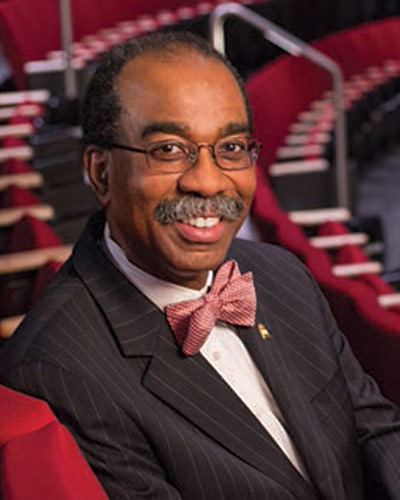 “It is amazing that we considered candidates from across the country in the recruitment for this position – only to find that the person most qualified was right next door!,” said Dr. Scalea. “Dr. Efron is everything we wanted for this position, and will be the ideal person to fill this critical slot. We are very excited for him to join our team!”
“It is amazing that we considered candidates from across the country in the recruitment for this position – only to find that the person most qualified was right next door!,” said Dr. Scalea. “Dr. Efron is everything we wanted for this position, and will be the ideal person to fill this critical slot. We are very excited for him to join our team!”
Dr. Efron, whose credo is, “it is all about the patient,” said he went into the field to treat the sickest patients with the widest range of health care needs.
“These patients come to us in the most dire, life-threatening circumstances, and they desperately need our help during their sickest days,” Dr. Efron said. “The Shock Trauma Center at University of Maryland sees the toughest cases in the state, and I am incredibly excited to be taking the helm of one of the foremost trauma centers in the world.”
Dr. Efron is profoundly committed to the delivery of high-quality care and has been known to make himself available on a 24/7 basis, regardless of whether he is on call. In 2017, he was recognized as “Physician of the Year” by Hopkins and was referred as “an exemplary leader who ensures that the patient is always at the center of the equation.” For the past 10 years, he has consistently been named a “Top Doctor” by Baltimore Magazine in trauma care.
After receiving his MD degree from Brown University School of Medicine in 1994, Dr. Efron completed his surgery residency at the Johns Hopkins School of Medicine in June 2002. He went on to complete a Surgical Critical Care fellowship at the Johns Hopkins Hospital. He has remained at Hopkins since then, and is certified by the American Board of Surgery in both the fields of Surgery and Surgical Critical Care.
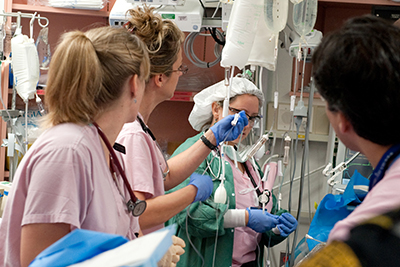 In January 2008, Dr. Efron was appointed the Director of Trauma and Chief of the Division of Trauma and Surgical Critical Care in the Johns Hopkins Hospital Department of Surgery. He has published more than 150 research articles, numerous case reports, and dozens of book chapters. His research mainly focuses on sepsis and inflammation. Additional research interests include traumatic injury from interpersonal violence, measures of violence intensity, and trauma recidivism with an eye to prevention strategies.
In January 2008, Dr. Efron was appointed the Director of Trauma and Chief of the Division of Trauma and Surgical Critical Care in the Johns Hopkins Hospital Department of Surgery. He has published more than 150 research articles, numerous case reports, and dozens of book chapters. His research mainly focuses on sepsis and inflammation. Additional research interests include traumatic injury from interpersonal violence, measures of violence intensity, and trauma recidivism with an eye to prevention strategies.
Serving as an international model for civilian and military trauma teams, the R Adams Cowley Shock Trauma Center is also the epicenter for trauma research, patient care, and teaching, both nationally and internationally today. Since its inception more than four decades ago, Shock Trauma has provided world-class treatment for the region's most critically ill and injured patients.
About the University of Maryland School of Medicine
Now in its third century, the University of Maryland School of Medicine was chartered in 1807 as the first public medical school in the United States. It continues today as one of the fastest growing, top-tier biomedical research enterprises in the world -- with 45 academic departments, centers, institutes, and programs; and a faculty of more than 3,000 physicians, scientists, and allied health professionals, including members of the National Academy of Medicine and the National Academy of Sciences, and a distinguished two-time winner of the Albert E. Lasker Award in Medical Research. With an operating budget of more than $1.2 billion, the School of Medicine works closely in partnership with the University of Maryland Medical Center and Medical System to provide research-intensive, academic, and clinically based care for nearly 2 million patients each year. The School of Medicine has more than $540 million in extramural funding, with most of its academic departments highly ranked among all medical schools in the nation in research funding. As one of the seven professional schools that make up the University of Maryland, Baltimore campus, the School of Medicine has a total population of nearly 9,000 faculty and staff, including 2,500 student trainees, residents, and fellows. The combined School of Medicine and Medical System (“University of Maryland Medicine”) has an annual budget of nearly $6 billion and an economic impact more than $15 billion on the state and local community. The School of Medicine faculty, which ranks as the 8th highest among public medical schools in research productivity, is an innovator in translational medicine, with 600 active patents and 24 start-up companies. The School of Medicine works locally, nationally, and globally, with research and treatment facilities in 36 countries around the world. Visit medschool.umaryland.edu
Contact
Office of Public Affairs
655 West Baltimore Street
Bressler Research Building 14-002
Baltimore, Maryland 21201-1559
Contact Media Relations
(410) 706-5260
Related stories
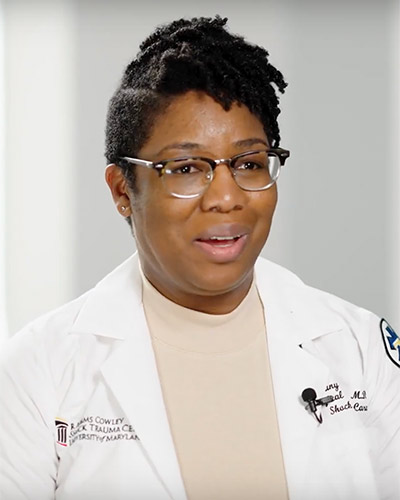
Monday, August 04, 2025
New Review Highlights Significant Need for Comprehensive Care for Gun Violence Survivors
A new review article published in JAMA underscores the critical need for comprehensive long-term medical care for patients treated for firearm injuries, which has become an epidemic in the U.S. fueled by years of rising gun violence. More than 48,000 people died of firearm injuries in the U.S. in 2022, according to the Centers for Disease Control and Prevention with 120,000 suffering from gunshot wounds that they recover from.

Wednesday, December 13, 2023
UM School of Medicine Awarded Up to $7.3M from DARPA to Drive Innovation in Trauma Triage Technology, Improve Mass Casualty Response Efforts
In an effort to better optimize the triage of patients during mass casualty events, University of Maryland School of Medicine (UMSOM) researchers are receiving up to $7.3 million in funding from the Defense Advanced Research Project Agency (DARPA) for vital new research. The funding will be used to support a study that will collect data over the next 3.5 years on trauma patients with the aim of identifying and implementing lifesaving advancements in medical triage for large-scale mass casualty incidents.

Monday, January 24, 2022
UM School of Medicine Surgery Professor Jonathan Bromberg, MD, PhD, Receives Prestigious NIH Award for Research on Immune System Regulation
University of Maryland School of Medicine (UMSOM) Dean E. Albert Reece, MD, PhD, MBA announced today that Jonathan Bromberg, MD, PhD, Professor of Surgery and Vice Chair for Research in the Department of Surgery, has received a prestigious aw ard from the National Institutes of Health (NIH) for his research into how the immune system regulates itself in the area of transplantation. The $2.3 million grant will enable him to learn more about how the immune system’s gatekeepers, called regulatory T cells, work to suppress the body’s immune response.
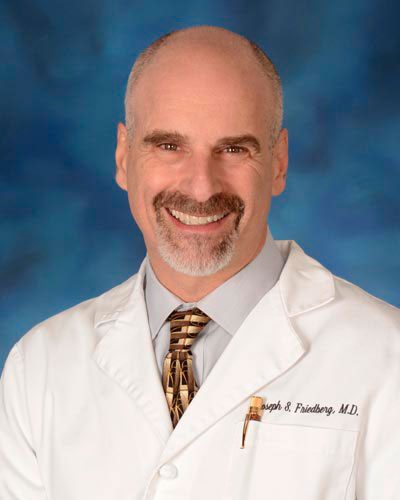
Thursday, January 31, 2019
University of Maryland School of Medicine Thoracic Surgeons Identify Lymph Nodes That May Help to Determine Prognosis for Patients with Pleural Mesothelioma
University of Maryland School of Medicine (UMSOM) surgeons have identified a group of lymph nodes in the chest that appear highly significant in predicting the prognosis for patients with malignant pleural mesothelioma – a deadly cancer of the chest lining that is usually caused by asbestos.
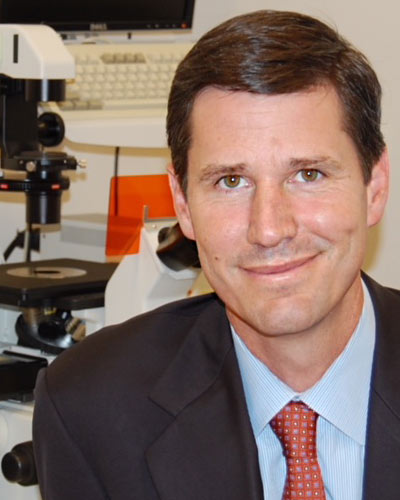
Thursday, June 07, 2018
Most Early-Stage Breast Cancer Patients with Intermediate Risk of Recurrence can Safely Avoid Chemotherapy
The majority of women with early-stage estrogen receptor (ER)-positive breast cancer, considered at intermediate risk of having their cancer recur based on a 21-gene test, can safely forgo treatment with chemotherapy, according to a large multicenter clinical study published in the New England Journal of Medicine.

Wednesday, October 26, 2016
Researchers Develop System to Classify Gunshot Wounds and Other Similar Injuries to the Head
Every year, more than 32,000 Americans die from gunshot wounds. A significant proportion of these deaths involve head wounds. Despite this massive public health burden, researchers know little about the variables that determine whether a victim of these injuries will live or die.
